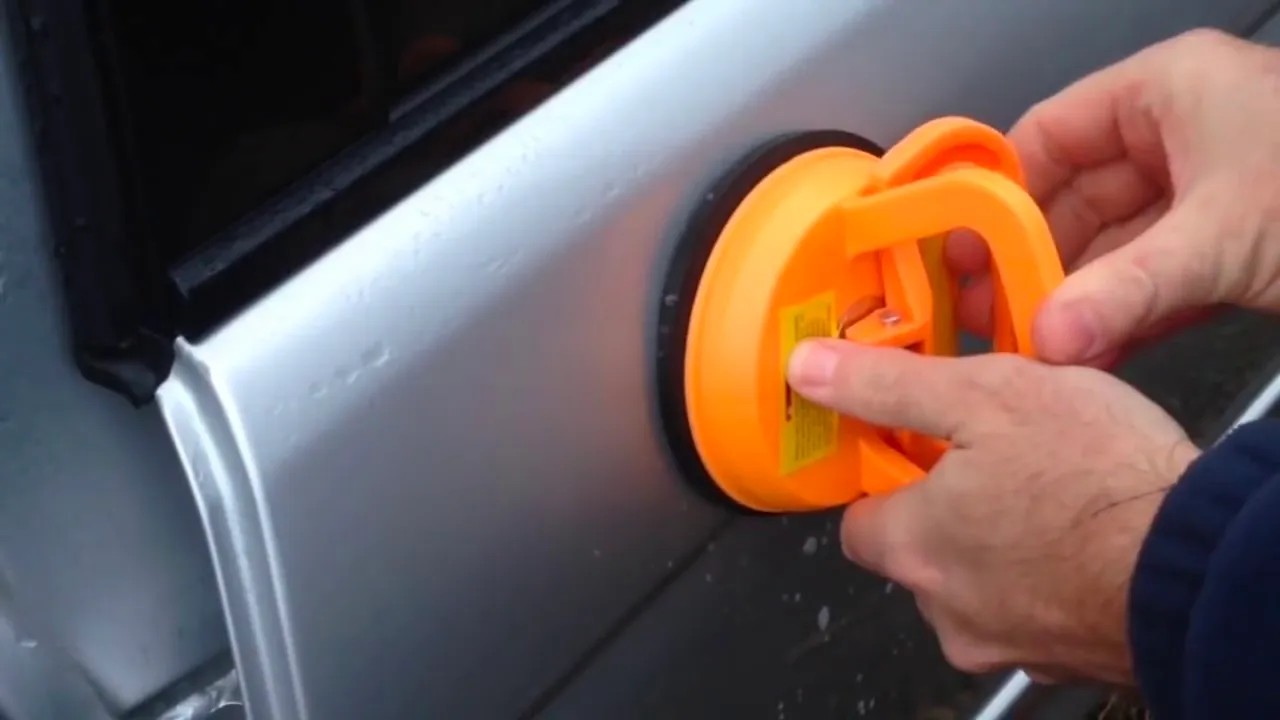Car dents are an unfortunate but common part of vehicle ownership. From minor dings caused by stray shopping carts to more noticeable dents from unexpected bumps, these imperfections can detract from your car’s appearance and value. If you’ve recently discovered a dent on your vehicle, you’re likely wondering about the repair process and, most importantly, how much to repair a dent in my car. This comprehensive guide will walk you through everything you need to know about car dent repair costs, helping you make informed decisions to restore your car to its former glory.
Understanding Car Dents and Dings
Before diving into the costs, it’s essential to differentiate between car dings and dents, as this distinction often influences the repair approach and price.
Dings vs. Dents: What’s the Difference?
While both dings and dents are forms of damage to your car’s body, they differ primarily in size and severity. A ding is generally considered a minor, shallow indentation, often less than an inch in diameter. Dings are typically caused by small objects like hail, pebbles, or car doors hitting your vehicle in a parking lot. They are usually superficial and may not always require professional intervention.
On the other hand, a dent is a more significant deformation of the car’s panel. Dents are larger, deeper, and often caused by more substantial impacts, such as collisions with other vehicles, posts, or larger debris. Dents can vary greatly in size and complexity and usually necessitate professional repair to restore the vehicle’s original shape and appearance.
Why Repairing Dents and Dings is Important
Regardless of whether you’re dealing with a minor ding or a more prominent dent, addressing these damages promptly is crucial for several reasons:
- Preventing Rust and Corrosion: Even a small dent can compromise your car’s paint and protective coating, exposing the bare metal underneath. This exposure makes your vehicle susceptible to rust and corrosion, which can spread and cause more extensive and costly damage over time.
- Maintaining Paint Integrity: Dents can stress and crack the surrounding paint, leading to peeling or further paint damage. Repairing dents promptly can help preserve the integrity of your car’s paint finish, preventing more significant cosmetic issues.
- Preserving Resale Value: Visible dents and dings significantly reduce your car’s resale value. Potential buyers often perceive body damage as a sign of neglect or more serious underlying issues. Repairing dents can help maintain your vehicle’s market value and make it more appealing when you decide to sell or trade it in.
- Aesthetic Appeal: Let’s face it, dents are unsightly. Repairing them restores your car’s appearance and pride of ownership, making your vehicle look its best.
Dent Repair Methods: DIY vs. Professional Approaches
When it comes to repairing a car dent, you generally have two main paths to consider: DIY (Do-It-Yourself) methods and professional repair services. The best option for you will depend on the size, location, and severity of the dent, as well as your budget and comfort level with auto repairs.
DIY Dent Repair: Exploring Dent Pullers and Kits
For minor dings and shallow dents, DIY dent repair kits and tools can be a cost-effective solution. One popular DIY method involves using a car dent puller.
Car Dent Pullers: How They Work
 Car dent puller tool being used to repair a minor dent on a car panel at Nathan's BMW Workshop. DIY car dent repair method.
Car dent puller tool being used to repair a minor dent on a car panel at Nathan's BMW Workshop. DIY car dent repair method.
Car dent pullers are tools designed to gently pull out dents from vehicle panels without requiring extensive bodywork. These tools typically use suction cups or adhesive tabs that attach to the dented area. By applying controlled pulling force, the dent puller aims to manipulate the metal back to its original shape.
Pros of DIY Dent Pullers:
- Cost-Effective: DIY dent puller kits are significantly cheaper than professional repairs, often ranging from $20 to $100.
- Convenience: You can perform the repair at home, saving time and effort compared to taking your car to a body shop.
- Quick Fix for Minor Damage: For small, shallow dents, dent pullers can offer a quick and effective solution.
Cons of DIY Dent Pullers:
- Limited Effectiveness: Dent pullers are generally only effective on minor, shallow dents located on flat panels. They may not work on larger, deeper, or dents in complex areas like body lines or curves.
- Risk of Further Damage: Improper use of dent pullers can potentially worsen the dent or damage the paint, especially if excessive force is applied.
- Not a Guaranteed Solution: Success with DIY dent pullers is not always guaranteed, and results can vary depending on the dent’s characteristics and your skill level.
Professional Dent Repair: When to Seek Expert Help
For more significant dents, dents in challenging locations, or if you prefer a guaranteed and high-quality repair, professional dent repair services are the recommended choice. Professional options include traditional body shops and Paintless Dent Repair (PDR).
- Traditional Body Shops: Body shops offer comprehensive dent repair services, handling everything from minor dings to major collision damage. They have skilled technicians, specialized tools, and paint matching capabilities to restore your car to its pre-damage condition. For severe dents requiring body filler, panel replacement, or repainting, a body shop is typically necessary.
- Paintless Dent Repair (PDR): PDR is a specialized technique that involves using specialized tools to gently massage and manipulate the metal from behind the dented panel, effectively “pushing” the dent out without damaging the paint. PDR is ideal for minor to moderate dents where the paint is intact. It’s often faster and more affordable than traditional body shop repairs because it avoids the need for filling, sanding, and repainting.
Pros of Professional Dent Repair:
- Expertise and Quality: Professional technicians have the skills, experience, and tools to handle a wide range of dent repairs to a high standard.
- Guaranteed Results: Reputable body shops and PDR technicians typically offer warranties or guarantees on their work, providing peace of mind.
- Comprehensive Service: Body shops can address all aspects of dent repair, including paintwork, color matching, and ensuring a seamless finish.
- Suitable for All Dent Types: Professionals can repair dents that are beyond the scope of DIY methods, including large, deep, or complex dents.
Cons of Professional Dent Repair:
- Higher Cost: Professional dent repair services are generally more expensive than DIY options.
- Time Commitment: Body shop repairs can take longer than DIY fixes, potentially requiring you to leave your car for a day or more.
Factors Affecting Dent Repair Costs
The cost to repair a dent in your car is not fixed and can vary significantly based on several key factors:
Size and Depth of the Dent
Unsurprisingly, the size and depth of the dent are primary determinants of repair cost. Smaller, shallower dings are easier and less time-consuming to repair, resulting in lower costs. Conversely, larger and deeper dents require more extensive work, potentially involving more labor, materials, and specialized techniques, thus increasing the price.
Location of the Dent
The location of the dent on your car also plays a crucial role in determining repair costs. Dents located on easily accessible, flat panels are generally cheaper to fix. However, dents in more challenging locations, such as:
- Body lines and creases: These areas require more precise and time-consuming work to restore the original contours.
- Edges of panels: Dents near panel edges can be more complex to repair without causing further damage.
- Areas requiring disassembly: If the dent is in a location that requires removing interior panels, lights, or trim to access the back of the dent, labor costs will increase.
- Aluminum panels: Repairing dents on aluminum panels often requires specialized tools and techniques, which can be more expensive than steel panel repairs.
DIY vs. Professional Cost Breakdown
To give you a clearer idea of how much to repair a dent in your car, let’s break down the average cost ranges for DIY and professional repair options:
- DIY Dent Repair Kits: DIY dent puller kits typically range from $20 to $100. This is the most budget-friendly option, but remember that it’s only suitable for minor damage and may not always yield perfect results.
- Professional PDR: For minor to medium-sized dents repairable with PDR, costs can range from $50 to $150 for smaller dents and $150 to $450 for larger or more complex PDR repairs. PDR offers a good balance of cost and quality for many types of dents.
- Traditional Body Shop Repair: Body shop repairs for dents can range from $200 to $1000 or more, depending on the dent’s severity, location, and whether painting is required. Extensive damage requiring panel replacement or significant bodywork can easily exceed $1000.
Note: These are average cost ranges, and actual prices can vary based on your geographic location, the specific repair shop, and the make and model of your vehicle. It’s always recommended to get quotes from multiple repair shops to compare prices and services.
Is Repairing a Car Dent Worth It?
Deciding whether to repair a dent in your car is a personal decision that depends on various factors, including the dent’s severity, your budget, your car’s value, and your aesthetic preferences.
Impact on Vehicle Value and Resale
As mentioned earlier, dents can negatively impact your car’s resale value. Even if the dent is purely cosmetic and doesn’t affect the car’s functionality, it can deter potential buyers and lower your trade-in offers. If you plan to sell or trade in your car in the future, investing in dent repair is generally a worthwhile investment to protect its value.
When to Repair vs. When to Leave It
-
Repair if:
- The dent is large, deep, or located in a prominent area.
- You are concerned about rust or paint damage.
- You want to maintain your car’s resale value.
- You value your car’s appearance and want it to look its best.
- Your insurance covers dent repair (after considering your deductible).
-
Consider leaving it if:
- The dent is very minor and inconspicuous (a small ding in a non-visible area).
- You are on a tight budget and the dent is purely cosmetic.
- You are planning to sell or trade in your car very soon and the dent is minimal.
- The cost of repair outweighs the perceived benefit for your situation.
Now You’re Ready…
Understanding how much to repair a dent in your car involves considering various factors, from the type and severity of the dent to the repair method you choose. By assessing the damage, weighing your options (DIY vs. professional), and considering the potential impact on your car’s value, you can make an informed decision that best suits your needs and budget. When in doubt, it’s always wise to consult with a professional auto body shop or PDR technician for an accurate assessment and repair estimate. This will help you confidently restore your car’s appearance and protect it from further damage.

